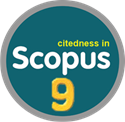The Effect of Individual Factors, Subjective Norms, and Self-Efficacy on the Intention of Whistleblowing
A Case of Students of the Faculty of Economics and Business, Airlangga University
Abstract
The Whistleblowing system is an effective way to prevent and combat practices that are contrary to ethics and applicable rules whose strength depends on the whistleblower. The system becomes useless when there is no desire or intention to report known acts of fraud or fraud. This research was conducted with the aim to find out information and empirical evidence of the influence of individual factors, subjective norms and self-efficacy on whistleblowing intentions on students of the Faculty of Economics and Business, Airlangga University. Respondents used in the study were undergraduate students of the Faculty of Economics and Business, Airlangga University in 2016 - 2018. The sample used was 400 students, by distributing questionnaires with various questions to see the views of students about the variables asked and measured by the Likert scale with value 1 - 5. The method used in this study is a quantitative method, with multiple linear regression analysis. The test results indicate that the independent variable has an effect on the dependent variable. Locus of control, personal cost, family support, self-confidence, and academic achievement influence the intention of whistleblowing. But the friend support variable produces a value that indicates that the variable has no effect on whistleblowing intentions.
Downloads
References
Ajzen, Icek. 1991. The theory of planned behavior. Organizational Behavior and Human Decision Processes. Vol. 50, No. 2, pp. 179-211.
Azwar, S. 1995. Sikap Manusia: Teori dan Pengkurannya, Edisi 2. Pustaka Pelajar, Yogyakarta.
Bagustianto, Rizki dan Nurkholis. 2015. Faktor-Faktor Yang Mempengaruhi Minat Pegawai Negeri Sipil (PNS) Untuk Melakukan Tindakan Whistle-Blowing (Studi Pada PNS BPK RI). Simposium Nasional Akuntansi 18. 16-19 September 2015. Medan.
Beatrice, Giovani. 2016. Pengaruh Faktor Organisasional, Faktor Individual, Dan Faktor Demografi Terhadap Intensi Whistleblowing. Repository Unair, Surabaya.
Bernawati, Y., & Napitupulu, G. (2018, June 30). The Effect of Organizational, Individual, and Demographic Factors on the Whistle-blowing Intention. Journal of Accounting and Strategic Finance, 1(1), 1-12. https://doi.org/https://doi.org/10.33005/jasf.v1i01.21
Chiu, Randy K. 2003. Ethical Judgment and Whistleblowing Intention: Examining the Moderating Role of Locus of Control. Journal of Business Ethics. Journal of Bussiness Ethics. Vol. 1, No. 2: Pp 65-74.
Curtis, Mary B. 2006. Are audit-related Ethical Decisions Dependent upon Mood?. Journal of Business Ethics.
Jogiyanto, 2007. Sistem Informasi Keperilakuan. Edisi Revisi. Yogyakarta: Andi Offset.
Kaplan, Steven E. dan Whitecotton, Stacey M.. 2001. An Examination of Auditors’ Reporting Intentions When Another Auditor is Offered Client Employment. A Journal of Practice and Theory. Vol. 20 (1); 45-63.
Khan, J.A., 2009. HPV Vaccination for the Prevention of Cervical Intraepithelial Neoplasia. The New England Journal of Medicine, 361(3): 271-278.
Mamahit, A., & Urumsah, D. (2018, November 30). The Comprehensive Model of Whistle-Blowing, Forensic Audit, Audit Investigation, and Fraud Detection. Journal of Accounting and Strategic Finance, 1(2), 153-162. https://doi.org/https://doi.org/10.33005/jasf.v1i2.43
Merdikawati, Risti dan Andri Prastiwi. 2012. Hubungan Komitmen Profesi dan Sosialisasi Antisipatif Mahasiswa Akuntansi Dengan Niat Whistleblowing. Diponegoro Journal Of Accounting. Volume 1, Nomor 1, Tahun 2012, Halaman 1-10.
Montesarchio, Cathilee E. 2009. Faktor influencing the unethical behaviora; intention of college business students: theory of planned behavior. Dissertation. Lynn University. www.proquest.com.
Samudra, Nurul Hidayati. 2014. “Persepsi Mahasiswa Terhadap Tindakan Whistleblowing. Fakultas Ekonomi Dan Bisnis Universitas Dian Nuswantoro Semarang”.
Septianti, Windy. 2013. Pengaruh Faktor Organisasional, Individual Situasional, Dan Demografis Terhadap Niat Melakukan Whistleblowing Internal. Simposium Nasional Akuntasi XVI. Manado: IAI.
Su, Chin-Chun dan Ni, Feng-Yu. 2013. Budgetary participation and slack on the theory of planned behavior. International Journal of Organizational Innovation. Vol. 5, No. 4. pp 91-99.
Copyright (c) 2020 Yustrida Bernawati, Rizqi Setyo Saputra

This work is licensed under a Creative Commons Attribution 4.0 International License.














